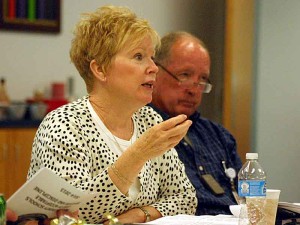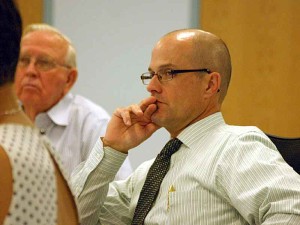Board’s policy review prompts discussion of telecommunications harassment
By JIM BROOKS
Nelson County Gazette / WBRT Radio

Board member Diane Berry makes a point during a discussion of policies on handling student disciplinary problems. Click to enlarge.
Thursday, June 5, 2014, 4:30 p.m. — A discussion of student discipline policies and their effectiveness dominated Thursday’s working session of the Nelson County Board of Education.
A committee formed of administrators across the district compiled a list of suggested changes. These were presented to the board by Sara Wilson, the district’s director of student support.
Harassing communications by electronic means, including social media, is an increasing problem that school principals are dealing with, Wilson said, and the committee suggested it be added as a form of harassment. “This is a routine, everyday practice,” Wilson told the board.
Board member Diane Berry expressed her concern about harassing communications, and added she was aware of one instance were electronic harassment resulted in a judge granting a request for a restraining order.

Board member Nicky Rapier gestures during the board’s working session on Thursday, June 5, 2014. Click to enlarge.
“My concern is that what I consider harassment may be different than what you consider harassment,” she said. “I’m sorry, but I don’t trust a principal to always make the right decision. How can parents know it will be handled the way it should be handled?”
Superintendent Anthony Orr said the school’s principal is responsible to make sure complaints are taken seriously and handled properly.
Board member Damon Jackey told Berry that having procedures in place was critical. “I don’t deny that it happens, but we need to make sure all the procedures are followed that we have in place.”
“Our job as a board is to write these policies and see that they are followed,” board member Nicky Rapier said. “If they aren’t followed we need to put people in place who will follow them.”
Orr said that parents often want to know how the perpetrator was punished for his or her actions, but administrators can’t reveal that information.
Berry asked how parents can know that harassment is being handled properly by teachers and not dismissed as name-calling or just joking around. “To that student its not kidding around, its serious,” she said.

Board chairman Frank Hall, left, and Superintendent Anthony Orr listen to a presentation during Thursday’s working session of the Nelson County Board of Education. Click to enlarge.
Orr said that handling discipline problems is an ongoing process that can take time. “When we won’t say we won’t tolerate [a behavior], it doesn’t mean that we solve it in three conversations and its over,” he said. “It means teachers do not have the option to ignore it, it has to be reported. A principal doesn’t have the option of saying ‘I don’t think that’s harassment,’ he said. “You treat it as serious as the words call for.”
Board member Larry Pate said the current disciplinary procedures are a big improvement over past procedures. “It used to be is was hid and hushed, and it got worse and worse,” Pate said.
In the review, Wilson told the board not all teachers are using the discipline referral form to report discipline issues to school administrators. Some teachers are using the Infinite Campus portal to report discipline issues, and the policy should reflect what is actually taking place.
Board member Nicky Rapier questioned if the two methods of reporting discipline problems created different methods for notifying parents. “If you put it on Infinite Campus and you don’t go to Infinite Campus, how will a parent ever find out?” he asked.
Superintendent Anthony Orr said the policy is to contact a parent or guardian anytime a student is talked to about a discipline problem.
Wilson said the administrators she talked to are not using Infinite Campus to contact parents in these cases. “Infinite Campus is only being used as a tool to communicate between teacher and administrator,” she explained.
Other recommended changes in the student behavior code is adding electronic cigarettes to the prohibition of tobacco product use and deleting the $5 fine for students caught smoking on campus. Administrators told Wilson the fine wasn’t an effective deterrent and it was hard to collect. Assigning a student who had three or more infractions of the tobacco rules to Horizon Academy is an additional penalty the committee suggested, Wilson reported.
Orr said rule infractions of these type would be appropriate for consequences that didn’t include school suspensions. Orr and the board discussed alternatives to suspensions that would offer consequences for students who violate the rules, but still allow them to attend classes.
Board chairman Frank Hall said it was important to have consequences for breaking the rules.
“If it means they trim the grass around school, that’s fine,” Hall said. “We just need to make sure there are some follow-through and consequences in it.”
-30-






